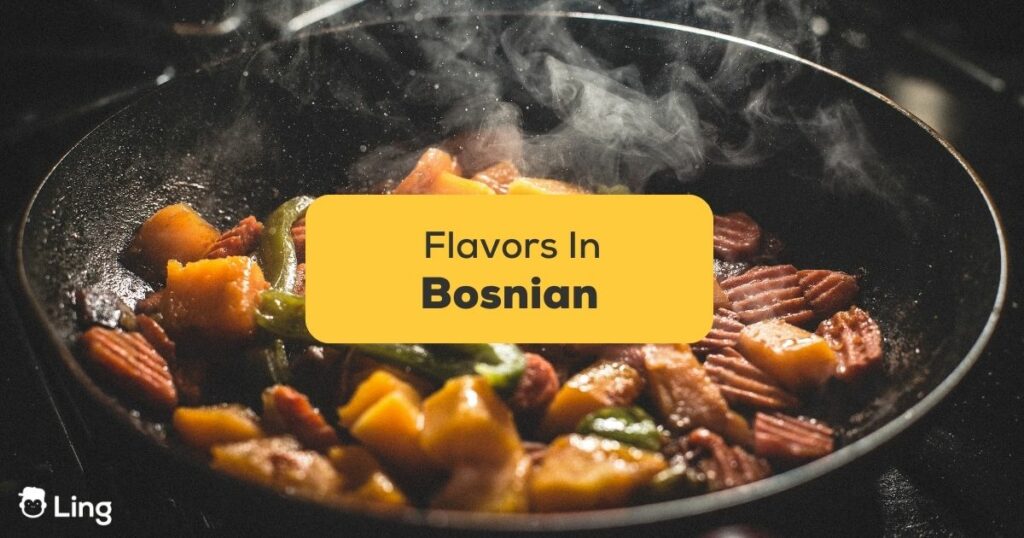Bosnia and Herzegovina might be known for its breathtaking landscapes and rich history, but let’s talk about something that really matters – the food. Oh, and not just any food, but an array of ukusi or flavors so delicious and unique that it might just make you book the next flight to Sarajevo. If your taste buds are already tingling, read on below as we go over the common words related to flavors in Bosnian. Let’s begin!
Ever heard of the Sarajevski Sahan or the mouthwatering Klepe? Let me assure you these dishes are not a treat for your taste buds; they take you on a culinary journey. But here’s the catch: To truly appreciate cuisine, you must familiarize yourself with its flavorful vocabulary. You see, simple words like “Slatko” (meaning sweet) and “Ljuto” (meaning spicy) go beyond being adjectives. Don’t believe me?
Then I invite you to grab your fork and knife (or a comfy seat if you’re just reading along), and let’s discuss the amazing words for flavors in Bosnian. Let’s dig in!

Flavors In Bosnian
Okay, so here’s where things get exciting. The word for “flavors” in the Bosnian language is “okusi.” Simple enough, right? But trust me, there’s so much more to it. Let’s get personal for a moment.
Imagine you find yourself at a bustling local restaurant in Sarajevo. The air is filled with tantalizing aromas, and you’re handed a menu filled with exotic dishes you’ve never even heard of. It’s thrilling but also a bit overwhelming. Now, picture having the magical key to unlock the mystery of Bosnian flavors – that’s right, I’m talking about knowing the specific words that describe each taste.
Sweet – “Slatko”
Ah, “Slatko” – a word that can make any dessert lover’s heart beat a little faster. In Bosnian, this term encapsulates everything sweet, delicious, and irresistible. But it’s more than just a word; it’s a delightful invitation to indulge in some of the country’s most beloved treats (like the apple-stewed Tufahija!).
Savory – “Slano”
In Bosnian, “Slano” is all about that rich, satisfying taste that fills your mouth with delight and leaves you craving more of those fancy burek and stuffed pita bread. It’s the saltiness that adds depth, the umami that brings complexity, and the flavor that defines comfort food.
Bitter – “Gorko”
Bitterness may be a flavor that’s often overlooked, but in Bosnian cuisine, it has its own charm and significance. “Gorko” refers to that robust, sharp taste that can add complexity and depth to a dish or a drink. Just think of the “Bosanska kafa” and your mouth will automatically imagine those bitter notes of coffee from the country!
Spicy – “Ljuto”
Going gaga over spicy things? Oh, friend, anyone who’s a fan of a little kick in their food will resonate with the word “Ljuto.” This Bosnian term refers to spicy flavors that ignite the palate and warm the soul. While Bosnian cuisine isn’t dominated by spiciness as in Asia, the use of “Ljuto” spices is a testament to the country’s appreciation for diverse flavor profiles.
Sour – “Kiselo”
In Bosnian culinary tradition, “Kiselo” encapsulates everything sour, tangy, and invigorating. This flavor profile isn’t just a palate cleanser; it’s a celebration of the contrasts and balances that make Bosnian food so unique and enjoyable. One of the most iconic “Kiselo” experiences in Bosnia is the enjoyment of pickled vegetables, known as “Turšija.” From cucumbers to peppers, these sour delights are a staple in many Bosnian homes and add a refreshing crunch to various dishes. The tanginess of Turšija is a welcome contrast to rich meats and savory pastries, creating a balanced flavor experience.
Then there’s the traditional sour milk or yogurt, often served alongside hearty meals. The creamy tang of this dairy product, called “Kiselo mlijeko,” brings a comforting, homey touch to the Bosnian dining experience.
Rancid – “Pokvareno”
While exploring the tastes of Bosnian cuisine, one word you’d never want to encounter is “Pokvareno,” which translates to “rancid.” Unlike the other flavors we’ve been reveling in, rancid is a term that warns you of something gone wrong. In the culinary world, “Pokvareno” signifies a flavor or odor that’s unpleasant, often a result of spoilage or decomposition. It’s a taste that you’d associate with oils that have gone off, dairy products past their prime, or meats that have not been properly preserved.
Acrid – “Žestoko”
Ever had a cup of coffee that was so robust it practically slapped you awake? Or a spirit that burned all the way down but left you smiling? That’s “Žestoko” for you! It’s like a rollercoaster of flavors, thrilling and unexpected. Technically, this word refers to that “fierce” or “intense” taste that not everyone may like.
Fishy – “Riblji”
The term “Riblji” is derived from the word for fish (“riba”) and is used to describe flavors reminiscent of the sea. While a fishy taste can be delightful when fresh seafood is on the menu, it’s not always a welcome descriptor. It can denote an overly strong, unwelcome taste indicating that the seafood isn’t at its freshest.

Learn Bosnian With Ling!
Has this exploration of the diverse and fascinating flavors in Bosnian made you curious about the Bosnian language itself? If you’ve found yourself captivated by the melodic words and rich cultural insights, then it might be time to take a step further and start learning Bosnian with Ling! Ling is a language learning app designed to help you master Bosnian and 60+ other languages as quickly as possible. Download it now for FREE from the App Store or Play Store!


































































